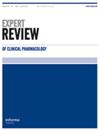Oral complement factor D inhibitor danicopan for paroxysmal nocturnal hemoglobinuria.
IF 3
3区 医学
Q2 PHARMACOLOGY & PHARMACY
引用次数: 0
Abstract
INTRODUCTION Paroxysmal nocturnal hemoglobinuria (PNH) is a rare hematological disorder characterized by episodic hemolysis, with additional clinical manifestations including thrombosis and bone marrow failure. The US FDA approved a complement factor D inhibitor, danicopan (Voydeya™), previously known as ACH-4471, for the treatment of extravascular hemolysis in adults with PNH on March 29, 2024. The primary purpose of this review is to examine the clinical efficacy and safety of danicopan. AREAS COVERED We systematically searched for articles on PubMed, Web of Science, and three publishers Springer, Elsevier, Wiley up to May 6, 2024. EXPERT OPINION Danicopan acts on the alternative pathway of the complement cascade, preferentially controlling C3 fragment-mediated extravascular hemolysis. Recommended dosage is 150 mg orally three times a day, which can be increased to 200 mg three times a day when necessary. Vaccination is required before administration to prevent infections by encapsulated bacteria. In a pivotal phase 3 trial ALPHA, danicopan significantly increased hemoglobin levels compared to placebo (P<0.0001), 60% of patients experienced an increase in hemoglobin levels of at least 2 g/dL, compared to none in the placebo group (adjusted difference of 47%; P<0.0001). Common adverse events during danicopan treatment include headache and upper respiratory tract infection.口服补体因子 D 抑制剂达尼可潘治疗阵发性夜间血红蛋白尿。
引言 阵发性夜间血红蛋白尿症(PNH)是一种罕见的血液病,以偶发性溶血为特征,并伴有血栓形成和骨髓衰竭等其他临床表现。美国 FDA 于 2024 年 3 月 29 日批准了一种补体因子 D 抑制剂 Danicopan (Voydeya™)(以前称为 ACH-4471),用于治疗成人 PNH 患者的血管外溶血。本综述的主要目的是研究达尼可潘的临床疗效和安全性。涵盖领域我们系统地检索了PubMed、Web of Science以及Springer、Elsevier、Wiley三家出版社截至2024年5月6日的文章。专家观点达尼可潘作用于补体级联的替代途径,优先控制C3片段介导的血管外溶血。建议剂量为口服 150 毫克,每天三次,必要时可增至 200 毫克,每天三次。用药前需接种疫苗,以防止被包裹的细菌感染。在一项关键性的 3 期试验 ALPHA 中,与安慰剂相比,达尼考潘可显著提高血红蛋白水平(P<0.0001),60% 的患者血红蛋白水平至少提高了 2 g/dL,而安慰剂组患者的血红蛋白水平没有提高(调整后差异为 47%;P<0.0001)。达尼可潘治疗期间常见的不良反应包括头痛和上呼吸道感染。
本文章由计算机程序翻译,如有差异,请以英文原文为准。
求助全文
约1分钟内获得全文
求助全文
来源期刊

Expert Review of Clinical Pharmacology
PHARMACOLOGY & PHARMACY-
CiteScore
7.30
自引率
2.30%
发文量
127
期刊介绍:
Advances in drug development technologies are yielding innovative new therapies, from potentially lifesaving medicines to lifestyle products. In recent years, however, the cost of developing new drugs has soared, and concerns over drug resistance and pharmacoeconomics have come to the fore. Adverse reactions experienced at the clinical trial level serve as a constant reminder of the importance of rigorous safety and toxicity testing. Furthermore the advent of pharmacogenomics and ‘individualized’ approaches to therapy will demand a fresh approach to drug evaluation and healthcare delivery.
Clinical Pharmacology provides an essential role in integrating the expertise of all of the specialists and players who are active in meeting such challenges in modern biomedical practice.
 求助内容:
求助内容: 应助结果提醒方式:
应助结果提醒方式:


